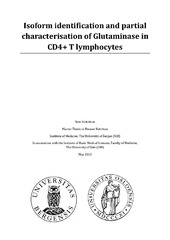Isoform identification and partial characterisation of Glutaminase in CD4+ T lymphocytes
Master thesis
Permanent lenke
https://hdl.handle.net/1956/6841Utgivelsesdato
2013-05-29Metadata
Vis full innførselSamlinger
Sammendrag
The proliferating phenotype is highly glycolytic and reliant on sufficient supply and synthesis of biosynthetic intermediaries to meet the demands of rapid cell replication. Glutamine contributes to this up-regulated synthetic machinery by providing critical anaplerotic carbon to the TCA cycle; nitrogen for nucleoside production; and, through its rapid conversion to lactate, the reducing agent NADPH necessary to maintain the increase in anabolic activity. Glutaminase represents a key step in this catabolism of glutamine and has been shown to be up-regulated in many different proliferating tissues. It presents a target for the possible suppression of undesired proliferation in over-reactive immunity. The expression of the three Glutaminase isoforms (KGA, LGA & GAC) where partially characterized using Western Blots in mature naïve and proliferating human CD4+ T lymphocytes after TCR-CD3/CD28 activation. Two Glutaminase inhibitors, BPTES and compound 968, were evaluated through 3H-Thymidine incorporation assays and mass spectrometry analysis of glutamine flux. In addition, the effects of glutamine removal from proliferating populations of human CD4+ T lymphocytes were also analysed Our results showed glutamine is absolutely necessary for optimal CD4+ T lymphocyte proliferation and that the Glutaminase isoform GAC is up-regulated in proliferating human CD4+ T lymphocytes. Its inhibition leads to attenuation in proliferative activity.
